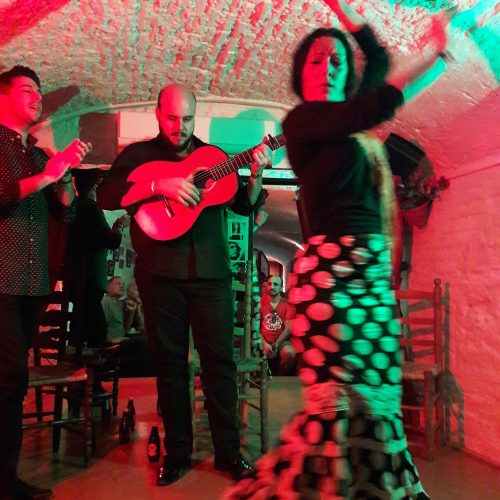
Learning Spanish through Entertainment
Dear Laura,
If you’re looking to really up your game in terms of language-learning there are so many great ideas you can find on this blog from reading in Spanish, to learning outside the classroom, to living with Spaniards, to the plethora of unconventional tips Claudia shares in this video. An option that has always been a favorite of mine is incorporating different Spanish-language media such as television, radio, and films into my daily life.
 Using entertainment to further your foreign language acquisition and comprehension is an excellent way to immerse in not only the language you are working on but also the associated culture! If you are living in Spain or another Spanish-speaking country, you will have direct access to local TV channels, radio stations, and live shows, which is ideal. However, if you’re not currently living abroad there are still plenty of entertainment options available to you through the internet, you just have to know where to look!
Using entertainment to further your foreign language acquisition and comprehension is an excellent way to immerse in not only the language you are working on but also the associated culture! If you are living in Spain or another Spanish-speaking country, you will have direct access to local TV channels, radio stations, and live shows, which is ideal. However, if you’re not currently living abroad there are still plenty of entertainment options available to you through the internet, you just have to know where to look!
Here are just a few of our favorite ways to get Spanish-language entertainment into our daily lives and keep language-learning alive even though we’re no longer in a traditional classroom setting:
Available while living in Spain:
Public TV: Personally, every apartment I’ve lived in here has come furnished and also equipped with a television set. (Yes, this is quite normal in Spain, read more about renting an apartment here and here.) Thus, I have all of the free, public television channels at the click of a button! You’re sure to find something you enjoy with 24-hour a day access to Spanish-language series, news broadcasts, and movies.
Allow me to share my two cents about American (and other English-language) series and movies that are broadcast on Spanish channels: While it can be tempting to tune into something you’ve watched at home and feel familiar with, keep in mind that the dialogue in these programs has sometimes been directly translated and thus the jokes and other idioms you may hear there are not always used in normal Spanish conversation. If you’re looking to pick up new vocabulary and expressions, choose an original Spanish-language show. Check out more on this topic in this article.
 Spanish radio: Although it seems to be a dying media with the prevalence of apps like Spotify, you can always tune into the local radio station whether you’re in your car, home, or anywhere else on your phone. Simply download an app like this one to connect. Not only is this a great way to keep up with the same music the locals are listening to, you can also get news about local happenings through the advertisements or insight into relevant hot topics through the talk show segments. This option is just bursting with expressions and idioms that real people use on a daily basis (and provides perfect conversation-starters at intercambios and other social settings).
Spanish radio: Although it seems to be a dying media with the prevalence of apps like Spotify, you can always tune into the local radio station whether you’re in your car, home, or anywhere else on your phone. Simply download an app like this one to connect. Not only is this a great way to keep up with the same music the locals are listening to, you can also get news about local happenings through the advertisements or insight into relevant hot topics through the talk show segments. This option is just bursting with expressions and idioms that real people use on a daily basis (and provides perfect conversation-starters at intercambios and other social settings).
Live entertainment: If you’re living in a Spanish-speaking country you should absolutely take advantage of the firsthand opportunities at your fingertips! Is there a concert, play, or comedy show happening in your area? Check out the flyers posted around town, the announcements on local radio stations, and any local-based Facebook groups or other sites like Couchsurfing or Meetup to keep up with what’s going on. At the same time that flamenco shows and other ‘espectaculos’ advertised in touristy areas can be fun, be aware that the more authentic options are generally less well-publicized. And if a new Spanish friend invites you to join them for an event, even better!
Available worldwide:
RTVE Online: Unlike American channel’s websites like NBC and ABCFamily that do not allow you to watch their online collection from abroad, Spain’s major networks allow you to tune into live TV as well as past episodes worldwide! This is thus an excellent way to keep up with shows you watched during your study abroad or teach abroad year in Spain or to find something completely new that you can’t find on more international platforms like Netflix.
 Netflix and other streaming services: If you already have a subscription to a streaming service like Netflix, you’re in luck. Shows like Casa de Papel (Money Heist in English), Las Chicas del Cable (The Cable Girls), and Elite are originally Spanish-language shows, making them the idea options for working not only on your language-skills but also incorporating Spanish culture. Additionally, you may also have the option to change any English-language shows to Spanish audio and/or subtitles but heed the same warning mentioned in public TV above. Don’t know where to start? Check out Lingopie’s list of the 17 Best Shows to Learn Spanish on Netflix.
Netflix and other streaming services: If you already have a subscription to a streaming service like Netflix, you’re in luck. Shows like Casa de Papel (Money Heist in English), Las Chicas del Cable (The Cable Girls), and Elite are originally Spanish-language shows, making them the idea options for working not only on your language-skills but also incorporating Spanish culture. Additionally, you may also have the option to change any English-language shows to Spanish audio and/or subtitles but heed the same warning mentioned in public TV above. Don’t know where to start? Check out Lingopie’s list of the 17 Best Shows to Learn Spanish on Netflix.
Youtube vloggers: Youtube is another great resource for you if you’re looking to follow native Spanish-speaking vloggers, Spanish-language teachers, or other Spanish-learners. There’s something for everyone on Youtube and you can easily add subtitles and change the speed of the audio to help you understand when you’re first getting started. I personally find this resource to be extra immersive as the real people you’ll encounter here (in comparison to characters you’ll encounter in TV shows and movies) tend to talk more like the everyday people you’ll meet on the streets of Spain.
Podcasts: Listening to podcasts is now my personal favorite form of media. It’s so convenient when you’re on the move (like when walking to and from English lessons or tapas bars) and it’s a great way to either be entertained or informed. You can also find a plethora of Spanish-language podcasts as well as English-language podcasts that are educational in terms of the Spanish language or culture.
 We hope this post helps inspire you to try out a new form of Spanish entertainment to further your curiosity with the language and culture. Stay tuned for more specific recommendations of particular TV shows, YouTubers, podcasts, etc that we enjoy—coming your way in Thursday’s resource list. Are there other forms of entertainment you’re already loving that you’d like to share with others? Please be sure to drop them below!
We hope this post helps inspire you to try out a new form of Spanish entertainment to further your curiosity with the language and culture. Stay tuned for more specific recommendations of particular TV shows, YouTubers, podcasts, etc that we enjoy—coming your way in Thursday’s resource list. Are there other forms of entertainment you’re already loving that you’d like to share with others? Please be sure to drop them below!
Sincerely,
Spain




